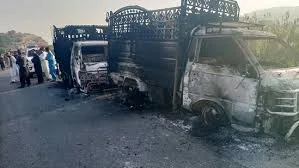Attacks in Balochistan
From Balochistan, bad news keeps flooding in. Over 70 individuals have died in a succession of well-planned militant strikes that have occurred throughout the province since Sunday night. These victims include members of the security services, the attackers, and regular residents. Following the execution-style murder of twenty-three passengers in Musakhail, the terrorists raided an FC camp in Bela, blew up a railway bridge in Bolan, and set many cars on fire at a Levies station in Mastung. The most extensive attack in recent memory is this one. The terrorist group BLA, which identifies as separatist, has taken credit for the incident, claiming to have taken over most of the roadways and a significant section of the FC camp.ISPR claimed that in response to these illegal acts, particularly in Musakhail, Kalat, and Lasbela, the security forces and law enforcement organisations acted swiftly, killing 21 terrorists in the process of clearing the area. Nevertheless, it also stated that four LEAs members and ten troops from the security services lost their lives in the operation. These horrifying assaults imply that militants from the Baloch region have stepped up their violent campaign against law enforcement and the government. Bringing `instigators, perpetrators, facilitators and abettors of these terrible and cowardly crimes to justice` is the army's pledge.
For many years, Balochistan has been in disarray. Several armed secessionist organisations have emerged within the previous 20 years, particularly after Nawab Akbar Bugti was killed in an army operation. Some of them are allegedly strongly linked to India and other nearby nations that are against the concept of a secure Pakistan. Security personnel, public buildings, Chinese interests, unarmed Punjabi labourers in Balochistan, and politicians who, in contrast to the militants, support a democratic fight for the political and economic rights of the Baloch have all been targeted by these organisations. We must vehemently denounce their terrible crimes and the murder of innocent people. The severity of these assaults ought to alert the nation as a whole, particularly its armed forces and political authorities.
Having stated that, the leadership in the fields of civil and security affairs needs to delve deeper into the Balochistan issue and pinpoint the causes of the escalating hostilities between the Baloch and the state, even despite taking active action against those who so viciously target the province. Young middle-class men and women are protesting for well-known reasons: human rights violations, denial of political rights, and bad socioeconomic situations. These are the reasons driving the current wave of discontent. These elements offer terrorist organisations, who are searching for disgruntled and irate members to join their ranks, a rich recruiting field.
Baloch voices—especially those who denounce violence and advocate for peace and sincere reform efforts—can no longer be ignored by the centre. The best way to eradicate the terrorists is to cooperate and pay attention to the people of Balochistan.











Comments
Post a Comment